Mozambique: Independence day attracts vendors to stadium, optimism about future
Cabo Delgado: Terrorism will not stop gas projects, says analyst
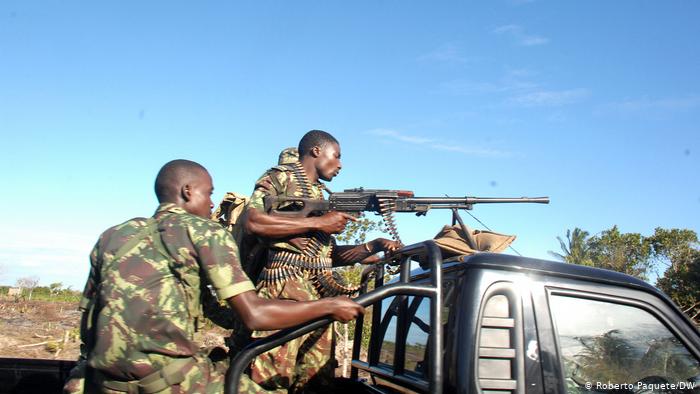
FILE PHOTO - Members of the Armed Forces of Mozambique in Cabo Delgado. [File photo: DW]
- Lisbon-based Mozambican analyst Fernando Cardoso believes that the attacks in Cabo Delgado will not hamper gas exploration projects in Mozambique, calling the terrorist movements a “counter-response” to the Maputo administration.
The terrorist groups active in Cabo Delgado in late December carried out at least two attacks close to the megaprojects led by the French company Total.
In a press release, Total said on Monday (04/01) that it had temporarily reduced its workforce at the project site in response to the “prevailing environment”, adding that it was in “permanent contact” with the Mozambican authorities. “The operating environment remains under continuous assessment and Total maintains constant communication with the Mozambican authorities on the matter,” the company stressed.
The project is the largest private investment in Africa, in the order of more than €15 billion.
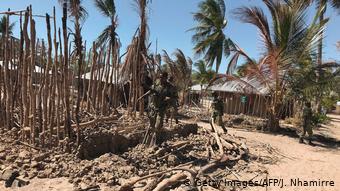
Armed violence in Cabo Delgado began three years ago and is causing a humanitarian crisis with more than 2,000 deaths and 560,000 people displaced, without adequate housing or food, mainly concentrated in the provincial capital, Pemba.
Some of the incursions have been claimed by the ‘jihadist’ Islamic State group since 2019.
Also read: “War in Cabo Delgado can only be solved through accord with Tanzania” – researcher.
DW Africa interviewed Fernando Cardoso, a specialist in African affairs, regarding the latest developments in Cabo Delgado.
DW Africa: Could the growing approach of terrorists to the greatest private investment in Africa jeopardise gas projects?
Fernando Cardoso (FC): Not in my view, at least at this moment. What Total did was to trigger a security protocol in which there is a withdrawal of working personnel to safer areas, in this case to the provincial capital [Pemba], to allow the Mozambican Armed Forces on the ground – possibly with the collaboration of the company’s own security forces – to carry out operations to clean the Afungi perimeter. It should be clarified that what was attacked was not the work area itself, but the security perimeter of Afungi, more specifically, two villages that served as the place of residence for workers and their family members.
DW Africa: Consultant Fitch Solutions understands that the attacks continue to threaten the construction of gas projects and future investments … Do you not share this conclusion?
FC: I will tell you why I don’t. Since the beginning of this month, there has been an increase in the operational capacity of Mozambican special forces on the ground, which have caused some damage and led to withdrawals by jihadist forces. These Mozambican special forces occupied a strategic nerve centre that established communications between the north and south of the province. In my view, what is happening is a counter-response and a war of movement on the part of the jihadist forces.

The second reason why I do not share this view is that Total has made a final investment decision that involves over US$20 billion (€16 billion) over time. A final investment decision is only made with two basic assumptions. The first is that there are safe buyers for the gas to be produced; the second is that there is the ability to create security conditions for the project to be developed.
DW Africa: The Defence and Security Forces (FDS) have reported success in their attacks on terrorists. Still, the insurgents managed to reach the vicinity of the Total project. Does this not put the achievements of the Mozambican Army into perspective?
FC: Sure. These are partial, temporary conquests … Nobody can predict the future. What we can say is that there was a change in performance and an offensive position by the Mozambican armed forces that had [previously] been on the defensive. But, clearly, we cannot predict the future.
About Fernando Jorge Cardoso
Integrated Researcher
CEI-IUL – Centre for International Studies (ESPP)
[Economy and Globalization]
CV Summary [@ ciencia.iscte-iul.p]
Fernando Jorge Cardoso coordinates the office of strategic studies and development of the Marquês de Valle Flôr Institute, IMVF. He is a guest associate professor at ISCTE-IUL, member of the respective Center for International Studies and executive director of the Lisbon Club. He is an economist, graduated (1976) from Eduardo Mondlane University and a doctorate (1991) with public habilitations (2006) from ISEG, the Higher Institute of Economics and Management of the University of Lisbon. In Mozambique, he was director of the School of Economics (1978-1983), advisor to the Minister of Planning (1977-1983) and general director of Maragra, a sugar company (1983-1985). In Portugal, he headed the Africa programme of the Institute for Strategic and International Studies (1991-2012), was vice-rector of the Modern University of Lisbon (2000-2007) and full professor at Fernando Pessoa University (2010-2012). Coordinated some 2 dozen research projects, conducted cooperation and development consultancies in various countries for UNDP, the EC, the Camões Institute and the PALOP-TL and organized and participated as a speaker in numerous national and international seminars. international. He was co-chair of the Organising Committee of the Estoril Conferences (2009 and 2011) and co-chair (2007-2015) of the Europe-Africa Policy Research Network (EARN), a group of 24 think-tanks and academic research centers from various European and African countries. . He was member of more tnah a hundred master’s and doctoral juries, is the author or co-author of a dozen autonomous books and publications and around half a hundred articles in books and academic journals, and has made numerous oral and written communications at academic and professional events. He is a regular collaborator in various national and foreign media. Current areas of interest are sustainable development, geoeconomics and geopolitics, and African studies.


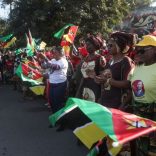
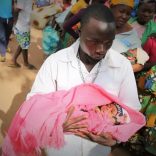
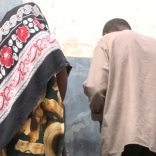

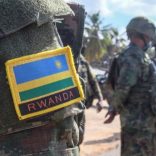






Leave a Reply
Be the First to Comment!
You must be logged in to post a comment.
You must be logged in to post a comment.